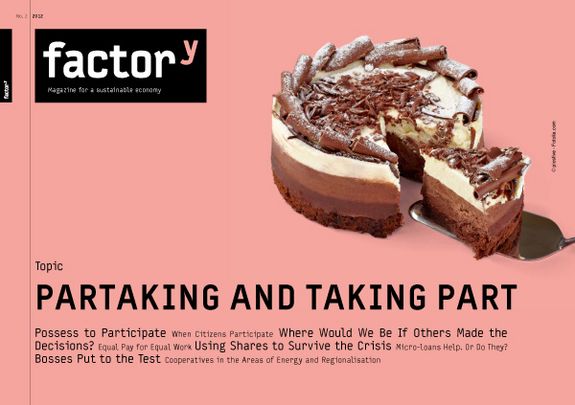Participation

Using Shares to Survive the Crisis

In the days of a globalized economy and the euro crisis, investments are a nightmare for many people. Just recently, the German Institute for Economic Research insisted that the national Riester supplementary retirement plan should be abolished, as it made sense only for those who lived beyond the age of 90. Where is it possible today to invest reasonably and safely?
By Christine Ax. Translated from the German by Eunike Bawarska and Katarzyna Piaseka
Invest where it has always made sense: in your region! Today this is possible with no problem. The Regionalwert AG in Freiburg and the Bürger AG für nachhaltiges Wirtschaften FrankfurtRheinMain are such new holding companies. They collect money from citizens and invest it in regional value chains. However, traditional enterprises such as the Sparkasse savings bank system and the Bochum utility company also issue equity funds. With the so-called KlimaBrief (climate bond) small investors support the constructing of regional renewable energy plants, an example being Regionalwert AG. Christian Hiss, the chairman of the stock corporation founded the enterprise three years ago. Since then, 500 small investors have contributed EUR 2m, which later on were invested by the stock corporation in the property and the enterprise itself. All the businesses that are financed in this way have something to do with organic farming or the processing and marketing of organic products. Two young farmers are supported in their search for and operation of an organic farm, the troki Manufaktur enterprise produces dried fruit and vegetables and there is the so-called Grüne Kiste (organic box). The organic box will be filled among other things with vegetables from a market garden belonging to the Regionalwert AG, and with fruit from an organic farm in which the Regionalwert AG has invested.
The wholefood shop that also belongs to Regionalwert AG offers its services to producers as a second trade channel. Marlene Svedas works there and is enthusiastic about this idea, saying that people should be able to purchase foods that are grown locally.
Meanwhile, Regionalwert AG has caught on in other places. The Bürger AG für nachhaltiges Wirtschaften FrankfurtRheinMain was formed in October 2011. It also aims to make a contribution in the region and to the region. There are now two major projects being financed and run by this citizen-owned company. One of these projects is the Fleckenbuehl farm in Cölbe near Marburg. Since 1984, the 260-hectare Demeter Farm has also admitted people in all kinds of life situations and has been helping them to live without addiction. More than 210 people work or go through training there. At Fleckenbuehl, bread specialties, cheese in countless variations as well as meat and sausages are produced. Using the capital of the citizen-owned company, there are plans to buy a herd of 30 suckler cows as well as to invest in meat processing and a bakery. The second Regionalwert project is a family-run business called Ackerlei near Frankfurt. Organic vegetables are cultivated there on 35 hectares. Over the next few years, a further 40 hectares of conventionally farmed land will be added to the farm and adjusted to the Bioland organic guidelines. With this total area, not only organic farming in the region will grow, but also the existence of the family-run business will be secured for the long term.
Hence, 20 jobs in the cultivation sector as well as in direct marketing have become more stable – and further jobs have already been planned. Another successful example is the KlimaBrief project run by the municipal utilities in Bochum and the local savings bank. The plans for this project were already developed before the reactor catastrophe in Fukushima. When the equity fund came out in April 2011, it was sold out within three hours, says Thomas Schoenberg, a press officer for the municipal utilities in Bochum. With a total value of shares ranging from a minimum of EUR 1,500 to EUR 10,000 per shareholder, there are approximately EUR 4m available for investments within the next five years. The first project has already been finalized: 309 solar modules in the residential buildings of the municipal housing community generate more than 60,000 kilowatt hours of clean power annually. Public companies are apparently very trustworthy, according to Schoenberg, who says that for the clients, not only a solid interest payment of 3.7 per cent is important, but also a good regional cause. The participating citizens are spared being potentially harmed by investors, who are purely profit-oriented. At the same time, Schoenberg underlines that they had addressed Bochum citizens only.
More articles to the range of subjects participation, partaking and involvement can be found not only online but also in our magazine Partaking & Taking Part. Nicely illustrated and readable on tablet computers and monitors the PDF magazine contains all posts and photos as well as additional figures and quotes.
Beiträge online
PARTICIPATION

- Possess to Participate
- When Citizens participate
- Using Shares to Survive the Crisis
- Mikrokredite helfen. Oder nicht?
- Nutzen statt Besitzen - ein neues Geschäftsmodell, oder was?
- Fairphone im Test: So komfortabel ist das soziale Smartphone
News zum Thema
- 01/2014 | Partaking and Taking Part
- 10/2013 | Crowdfunding for Sustainability-Maker
- 08/2013 | A Map for sustainable shopping in NRW
- 01/2013 | Exclusion makes people sick
- 01/2013 | Unmotivated, uninspired, uninvolved
- 03/2012 | The RV of the Future
- 03/2012 | Sustainia: A Sustainable Virtual World Is Born
Themen
- The Domino Effect: the Mobility Transition as an Engine for the ‘Great Transformation’
- Cities Use the Space
- Decarbonization by 2030
- The fear of biting the hand that feeds you
- Where investing is a pleasure
- Why divestment is going to change the world
- A Robin Hood tax for climate protection
- May the Force Be with Us
- Modern Strategies
- The prerogative of interpreting the future now lies with the companies involved in climate protection”
- From Negotiating to Trading Equitably
- Can a donkey be tragic?
- Rethink rather than rebound: a sufficiency revolution must precede the efficiency revolution
- On Rebound, Prebound and Performance Gaps
- So Let Us Seize Power Then!
- With Common Property Against Political Failure
- So Let Us Seize Power Then!
- The Comforting Beauty of Failure
- “It Is Not Impossible at All.“
- Resource-light shopping
- Men Have Not Stopped Giving the Advantage to Women – So Far
- Toothpaste for Princesses and Soup for Pirates
- It is about equality
- A nice day
- Initiative instead of frustration
- The right ingredients
- Resilient for Life
- Not only, but also
- Appreciation – more please!
- Worth more than money
- Learning to value the value of goods
- Worth and Values
- The Transformative Power of Science
- Historically effective: How innovation and technology transform
- The Disappearance of Products
- Growing Older 101
- Columbus’ Egg
- It Works! In Theory at Least ...
- What If...?
- Analysing Separately – Thinking and Acting Together!
- Let’s Break Away from Determined Breaking Points
- More Gold in Waste than in Mines
- The art of separation
- Should you really DIY?
- The Aesthetics of Do-It-Yourself
- Standing on One’s Own Feet
- From the handaxe to desktop fabrication
- Using Shares to Survive the Crisis
- When Citizens participate
- Possess to Participate
- The Right Growth at the Right Time
- Gunter Pauli and Blue Economy
- When Sustainability Grows
- How we treat Growth
- Illusions about Growth

